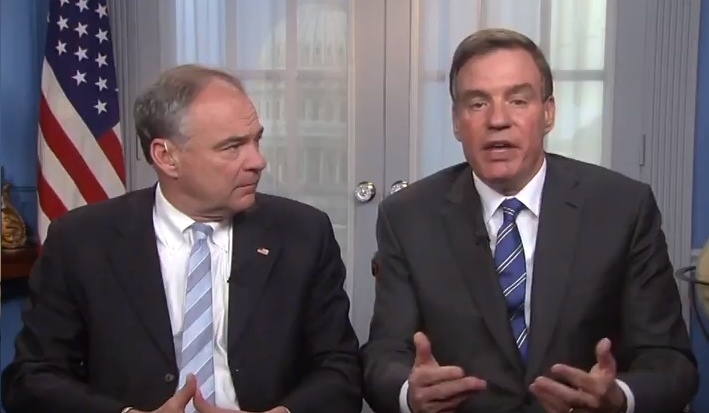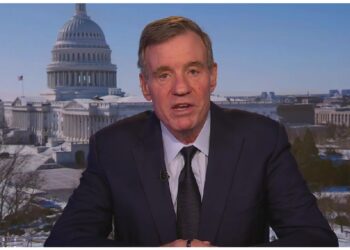See below for statements by Senators Mark Warner and Tim Kaine, moments after the U.S. Senate passed the $1.9 trillion American Rescue Plan…with only Democratic votes, by the way, as Republicans apparently do not favor providing desperately needed assistance to the American people. Don’t forget that the next time you vote!
STATEMENT OF U.S. SEN. MARK R. WARNER
~ On Senate passage of the American Rescue Plan ~
WASHINGTON – U.S. Sen. Mark R. Warner (D-VA) released the following statement after voting for the American Rescue Plan, legislation to provide emergency relief to the American people and defeat the COVID-19 pandemic:
“This legislation will help our country defeat COVID-19 and get back to normal. It includes desperately needed resources to get vaccines into arms; help schools reopen safely; and provide much-needed lifelines to the communities hardest-hit by this virus.
“I will be the first to acknowledge that this bill is not perfect. I am glad that as the Senate considered this legislation, we made some important changes to target aid where it is most badly needed as millions of Americans remain out of work, state and local governments continue to lay off workers, and small businesses struggle to keep their doors open.
“I’m especially proud that I was able to work with President Biden and my colleagues to add funding to expand access to high-speed internet, which is a necessity, not a luxury, during COVID-19. The $17 billion we secured to help expand broadband infrastructure and affordability represents the largest-ever federal investment of its kind and will be a significant boost to our economy as we work to rebuild and recover from COVID-19.”
According to current estimates, there are approximately 700,000 Virginians who still lack access to high-speed internet, which has become increasingly essential for telecommuting, distance learning, telemedicine, and more amid the COVID-19 crisis. As a former governor and now in the Senate, Sen. Warner has long fought for increased access to broadband in the Commonwealth. In December, Sen. Warner negotiated and passed COVID-19 relief legislation that included $7 billion towards broadband, including $3.2 billion for an Emergency Broadband Benefit to help low-income families maintain their internet connections, $285 million to support broadband access in minority communities, and $300 million in broadband grants modeled on bipartisan provisions Sen. Warner drafted with his colleagues. Sen. Warner has also introduced comprehensive broadband infrastructure legislation to expand access to affordable high-speed internet by investing $100 billion to build high-speed broadband infrastructure in unserved and underserved communities, and has also introduced bipartisan legislation with Sens. Lindsey Graham and Tim Scott (R-SC) to establish a $10 billion Broadband Development Fund to prioritize funding for areas that currently lack service, support the deployment of advanced technologies in areas where there is the greatest need, and encourage projects that can quickly provide internet service.
According to the Federal Communications Commission (FCC), about 21 million Americans do not have access to 25/3 mbps internet, which is the FCC’s standard for high speed broadband. Of that 21 million, 16 million live in rural areas, while 5 million live in urban areas.
**************************
KAINE APPLAUDS WINS FOR VIRGINIA IN AMERICAN RESCUE PLAN
WASHINGTON, D.C. – U.S. Senator Tim Kaine applauded Senate passage of the American Rescue Plan, a $1.9 trillion COVID-19 relief bill that includes numerous critical wins for Virginia. The bill will now return to the House of Representatives.
“Because of this bill, millions of Virginians will receive a stimulus check, unemployment benefits will last through the summer, and 85,000 of the Commonwealth’s children will be lifted out of poverty,” said Kaine. “The past year has been dark, but with this much-needed relief and the acceleration of vaccinations, a brighter, healthier, more prosperous America is on the horizon.”
Provisions of the American Rescue Plan include:
Aid for unemployed workers: The bill extends federal unemployment benefits until September, allowing Virginians who are out of work due to the pandemic pay bills while the economy continues to recover and jobs are not widely available. Senator Kaine has consistently supported expanded UI benefits and extending federal support while the pandemic continues. The nation is still down nearly 10 million jobs from when the pandemic started, and more than 250,000 Virginians would have been at risk of losing benefits in March and April without this extension. The bill also exempts the first $10,200 in UI benefits from federal taxes for low- and middle-income households, preventing surprise tax bills for out of work Virginians.
Assistance for struggling households: The bill increases the size of the direct payments passed in December by another $1,400 per person, bringing the total to $2,000 per person. This round of direct checks will include adult dependents, as Senator Kaine has pushed for. The legislation also adds funding to the rental assistance passed in December and adds relief for homeowners at risk of foreclosure, similar to legislation cosponsored by Senator Kaine. Additionally, the bill will enhance the Earned Income Tax Credit (EITC) and Child Tax Credit (CTC), providing aid to low-income workers and families, and lifting millions out of poverty. More than 1.5 million Virginian children will benefit from the CTC expansion, including lifting 85,000 Virginian children out of poverty.
Health care provider mental health: The bill includes $80 million to train health care professionals and public safety officers in strategies to reduce and address suicide, burnout, and mental and behavioral health conditions; $20 million for the CDC to carry out an education and awareness campaign to encourage health care professionals and first responders to seek support and treatment for their own behavioral health concerns, identify and respond to risk factors in themselves and others, and address stigma; and $40 million in grants for health care providers to establish or expand programs to promote mental and behavioral health among their health professional workforce. The provisions are modeled after the Dr. Lorna Breen Health Care Provider Protection Act, legislation Kaine sponsored in honor of a physician from Charlottesville, Virginia, who died by suicide after working on the frontlines of the pandemic in New York.
Supporting public health data modernization: The bill provides $500 million to support and strengthen our public health data surveillance and analytics systems at the CDC. Kaine has long advocated for modernizing these systems so we can better respond to public health threats in real time, even before the pandemic. He was pleased his Saving Lives Through Better Data Act passed at the end of last year and is glad to have secured additional funding for the effort in this package.
Aid for vaccine distribution and virus tracking: The bill provides $20 billion to improve vaccine distribution, $10 billion for the Defense Production Act to procure essential medical equipment, and $50 billion for virus testing, genomic sequencing to detect new variants, contract tracing, and additional PPE.
Funding to safely reopen schools: In addition to state and local relief, the bill provides $125.8 billion for K-12 schools to reopen safely, including $3 billion to support students with disabilities and $800 million to support homeless children and youth. Funds could be used to purchase PPE, reduce class sizes, repair ventilation systems, hire support staff, and implement other CDC-recommended public health measures. School districts could also use funds to help students who have fallen behind catch up and get back on track. The bill also provides $40 billion to help institutions of higher education.
Child care: The bill invests $39 billion in child care providers through the Child Care Development Block Grant Program. These funds can be used by child care providers for operating expenses, PPE, personnel cost, and financial relief for struggling families to cover tuition. As of last fall, more than a third of child care providers had closed in Virginia, eliminating 168,000 slots for children. The provisions are modeled after Kaine’s Child Care is Essential Act. Virginia is estimated to receive $796 million of these funds.
State, local, and tribal aid: The legislation will provide $350 billion in relief to state, local, and tribal governments, a top priority of Senator Kaine. It also includes more than $31 billion in targeted resources to Native American communities, which will benefit Virginia’s federally recognized tribes. Virginia has used past federal funding to provide hazard pay for direct care workers, support rental and mortgage relief, and expand broadband access. This new round of funding will help Virginia continue to take public health measures and address the negative economic effects of COVID while also including more flexibility to help local Virginia governments experiencing revenue shortfalls prevent budget cuts.
Helping restaurants and other small businesses: In addition to providing an additional $7.25 billion to expand access to the Paycheck Protection Program (PPP) for nonprofits and other organizations, the bill establishes a $25 billion Restaurant Revitalization Fund to provide grants for restaurants. The bill also adds $15 billion for the Targeted Economic Injury Disaster Loan (EIDL) Advance program to help the hardest-hit small businesses.
Broadband: In addition to the opportunities provided through aid to support state, local, and tribal governments, $7 billion is provided for the Federal Communications Commission to operate the Emergency Connectivity Fund. This fund will support broadband access for students by providing telecommunications services to schools and libraries.


















